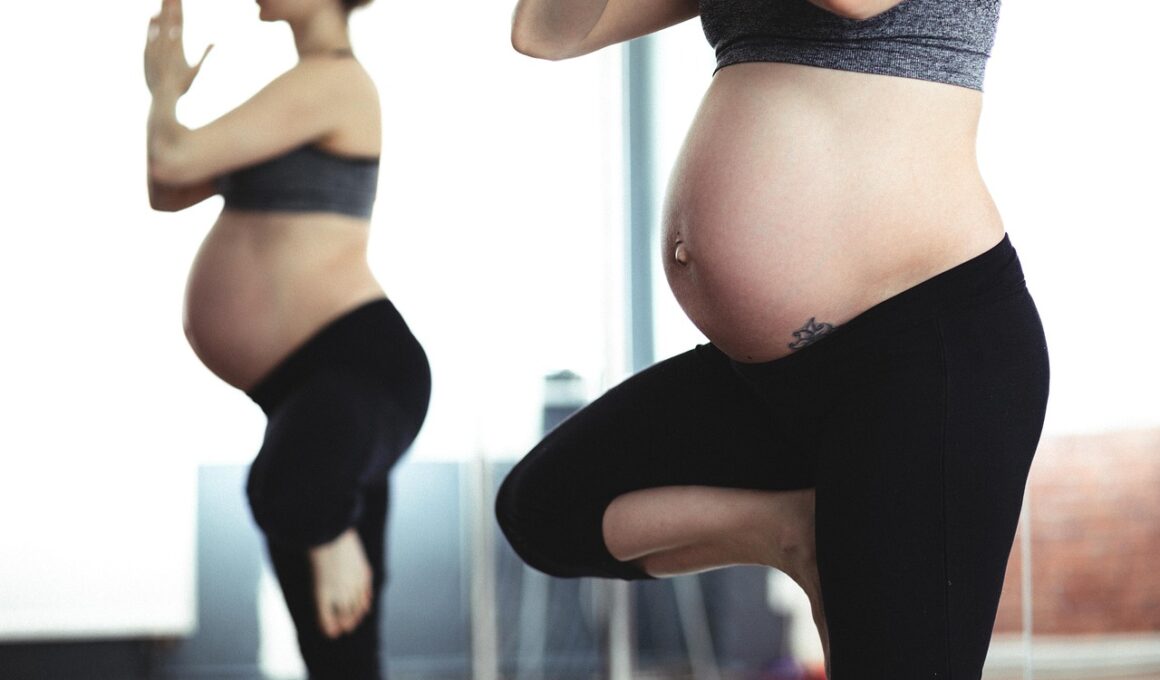The Science Behind Exercise and Mood Regulation During Pregnancy
Pregnancy is a unique period in a woman’s life, characterized by significant physical and emotional changes. Expecting mothers experience a variety of hormonal fluctuations that can impact their mental health. Research indicates that regular physical activity can play a crucial role in alleviating symptoms of anxiety and depression during this time. Exercise enhances mood by promoting the release of endorphins, which are natural mood lifters. This release helps in combating stress and fostering a sense of well-being. Moreover, participating in exercise can increase self-esteem and body image, attributes that are often challenged during pregnancy. Incorporating simple activities like walking, swimming, or prenatal yoga can encourage physical health. These activities can be adapted to suit different fitness levels and should be discussed with a healthcare provider. Engaging in consistent exercise during pregnancy may also enhance energy levels, improve sleep quality, and prepare the body for labor. For a more effective pregnancy journey, maintaining an active lifestyle is recommended, ensuring not only physical fitness but also emotional stability which ultimately benefits both mother and baby.
Understanding Mental Health During Pregnancy
Mental health is an essential aspect of overall well-being, particularly during pregnancy. Hormonal changes, along with physical discomfort, can lead some women to experience mood swings, anxiety, or depression. It’s essential to recognize these feelings as normal and seek support when needed. Engaging in regular exercise can improve mental resilience. Studies suggest that exercise can help pregnant women cope with stressors effectively and reduce levels of cortisol, a stress hormone. Taking care of mental health proactively facilitates a more enjoyable pregnancy and prepares mothers for the upcoming challenges of motherhood. Communication with healthcare providers about mental health concerns is crucial for effective management and support. This can include having discussions about exercise, counseling, or even medication if necessary. Additionally, joining support groups can provide valuable insight and connection with other expectant mothers facing similar challenges. Maintaining strong mental health is beneficial for both the mother’s and baby’s well-being, underscoring the importance of integrating physical activity into prenatal care routines. Therefore, focusing on holistic health practices encompassing both physical and emotional realms can lead to a more satisfying pregnancy experience.
Moreover, the type of exercise undertaken also plays a significant role in managing mental health during pregnancy. Low-impact activities are often recommended, as they are gentle on joints and can be easily incorporated into daily routines. Options such as yoga and Pilates not only strengthen the body but also promote relaxation and mental clarity. These exercises emphasize breathing techniques and mindfulness, which are instrumental in managing anxiety. Some studies have shown that prenatal yoga can significantly improve mood while decreasing stress levels. Additionally, group classes can foster a sense of community, providing social support and reducing feelings of isolation, which often accompanies pregnancy. Exercise can also provide a much-needed escape from the day-to-day challenges faced during pregnancy, offering a moment to focus solely on well-being. Ensuring safety during exercise is of paramount importance, particularly as the pregnancy progresses. Pregnant women should listen to their bodies, adapting their exercise routines as needed and consulting with healthcare professionals about any concerns. Developing a sustainable routine focused on joy and well-being ensures both physical and mental health are prioritized during this transformative phase.
The Role of Social Support and Community
Social support is another key factor contributing to mental health during pregnancy. Maintaining connections with family and friends helps expecting mothers feel less isolated. Support can take many forms, from emotional encouragement to practical assistance. Joining prenatal fitness classes can serve dually as a means of exercise and as a way to build relationships with others sharing similar experiences. Such interactions foster a sense of belonging, which is crucial for emotional well-being. Activities within a community setting can help normalize the diverse feelings associated with pregnancy. Engaging with others can provide opportunities for sharing personal stories, coping strategies, and even workout tips. Importantly, these interactions can help diminish feelings of anxiety, fostering a reassuring environment. Additionally, participating in group exercises can motivate mothers to stick with their fitness plans, enhancing consistency. Finding a supportive network helps cultivate both physical and psychological resilience. Whether through community centers, online forums, or social media, expectant mothers can find platforms to connect and support each other, underscoring the importance of strong relational ties during pregnancy.
Implementing exercise routines tailored to individual needs is vital in addressing both physical and mental health during pregnancy. It’s important to develop an enjoyable exercise plan that encourages adherence. Perhaps beginning with short walks or gentle stretching sessions can ease mothers into a more active lifestyle. As endurance builds, activities can gradually become more engaging or varied. Also, ensuring an element of fun, such as listening to music or exercising outdoors, can enhance motivation. It’s helpful to incorporate rest days into the routine, as recovery is equally important for mental well-being. Ultimately, tuning into the body’s signals is essential for maintaining a positive experience with exercise. This balance enables the incorporation of physical activity without overwhelming discomfort. Consulting with fitness and health professionals specializing in prenatal care can tailor routines that suit individual preferences and fitness levels. The aim is to create a personalized plan that brings joy and promotes sustained engagement. Such tailored fitness endeavors can yield wonderful results in managing stress, anxiety, and overall mental health, enriching the experience of pregnancy and empowering mothers.
Long-term Benefits of Exercise on Mental Health
Engaging in regular exercise during pregnancy is not only beneficial in the short term but can also positively impact long-term mental health. Studies indicate that women who maintain an active lifestyle during pregnancy are more likely to continue exercising postnatally. This commitment can help mitigate the risk of postpartum depression and anxiety. Furthermore, the skills and habits developed during pregnancy can create a framework for ongoing physical activity. Establishing these routines early makes it easier to incorporate fitness into daily life as children grow. Additionally, maintaining physical fitness can enhance energy levels, reduce fatigue, and improve mood long after childbirth. Mothers who engage in consistent exercise often report higher levels of overall happiness and life satisfaction. A strong focus on self-care and physical activity contributes to a positive self-image and emotional well-being. For mothers, prioritizing mental health through exercise not only benefits themselves but also sets a healthy example for their children, instilling the value of fitness from an early age. This cumulative effect ultimately fosters a culture of health and happiness within families, promoting a balanced lifestyle.
In summary, the relationship between exercise and mental health during pregnancy is profound. Exercise serves as a natural method for regulating mood, alleviating stress, and improving overall mental well-being. Understanding the impact of physical activity on emotional health can encourage expecting mothers to prioritize fitness. By combining exercise with social interactions and community support, mothers can create a nurturing environment for themselves and their babies. It’s crucial for women to recognize the normal fluctuations in mood and seek help when necessary. Engaging in consistent exercise provides a multifaceted approach to tackling the challenges associated with pregnancy. Ultimately, this holistic focus on both physical and emotional health can foster resilience and adaptability throughout pregnancy and beyond. Therefore, women are encouraged to explore various forms of exercise that resonate with them and align with their health needs. Consultation with healthcare providers can ensure safe and effective practices, enriching the overall pregnancy experience. By prioritizing their mental health through exercise, mothers can not only enhance their own well-being but also set the foundation for a loving, healthy family dynamic.


